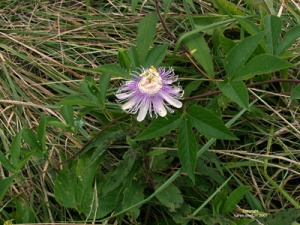Passiflora incarnata
| See Also | Botanical Monographs |
|---|
Passion Flower (Passiflora incarnata) is regarded as a general nerve tonic. It is known for its ability to calm the mind and to treat insomnia. To explore the characteristics, medicinal uses and prescribing considerations of this herb in more detail, check out the references indicated.[1], [2]
Contents
Characteristics
- Common Names: Passion flower, Maymop, Apricot vine, Wild passion flower, Passion vine, Grenadille
- Family: Passifloraceae
- Habitat: Passiflora can be found in tropical Americas, the East Indies and now grows in the Southeastern U.S.A. and Southern Europe.
- Parts Used: Whole plant collected during fruiting period (45% alcohol)
- Constituents: Flavonoids, alkaloids
- Medicinal Actions: nervine, sedative, antispasmodic, analgesic, anxiolytic, stimulant
Uses
Historical Uses:
Passion Flower is known for its soothing properties and has been used historically as a general nerve tonic. It is best known for its ability to aid sleeplessness due to an active mind.
Medicinal Uses:
Internal
- Nerve Tonic
- used for restlessness, tension, and insomnia
- Restlessness, wakefulness from exhaustion or debility from nervous excitement
- Insomnia from worry, in infants, the elderly, from mental overwork, and fever. The sleep induced is peaceful, patient awakes quiet and refreshed
- post-herpetic nerve pain, shingles, neuralgia
- Nervous from menstrual disturbances, prolonged illness
- Convulsive movements, tetanus
- Epileptic attach (at first warning)
- Nervous headache, headache of debility or cerebral fullness
- Palpitations from excitement, shock, nervousness
- Nervous tachycardia
- Spasmodic asthma
- Spasmodic disorders: worms in children, chorea (especially in girls approaching first menstruation)
- alcoholism and drug abuse
- used in stop smoking programs
External
- Conditions
- hemorrhoids, burns, inflammation (sitz bath)
Prescribing Considerations
The information provided is intended to augment the treatment from a naturopathic doctor or other trained medical professional. Although most herbs are generally safe, it is recommended that you avoid self-prescribing especially when there is an underlying ongoing medical condition, if you are on any prescription medications or if you are pregnant or breastfeeding.
Formulations and Preparation
- Tincture - 10-120 drops three times daily, 10 drops every 1/2 hour for children
- Fluid extract - 10-60 drops three times daily
- Infusion - 2g/150mL of water; 20g in 200mL bath water for hemorrhoids, as needed
- Powder - 2-10g daily
Safety
The safety and prescribing considerations for this herb include:[3], [4]
- Generally regarded as safe.
- Side-effects: sedation
- Contraindicated in pregnancy (uterine stimulant)
- Drug-Herb Interactions.[2]
- SSRIs, MAOIs, and Tyramine-containing Foods - Caution with co-administration
- Barbiturates and Sedatives - May potentiate
References
- ↑ Boon Heather, Smith Michael (2009) 55 Most Common Medicinal Herbs: The Complete Natural Medicine Guide Second Edition Institute of Naturopathic Education and Research, CCNM Toronto.
- ↑ 2.0 2.1 Godfrey Anthony, Saunders Paul, Barlow Kerry, Gowan Matt (2011) Principles and Practices of Naturopathic Botanical Medicine, Advanced Botanical Medicine. V3 CCNM Press, Toronto.
- ↑ Stargrove Mitchell Bebell, Treasure Jonathan, McKee Dwight L (2008) Herb, Nutrient and Drug Interactions: Clinical Implications and Therapeutic Strategies.
- ↑ Brinker Francis (1997) Herbal Contraindications and Drug Interactions: Plus Herbal Adjuncts With Medicines, 4th Edition Eclectic Medical Publications.
